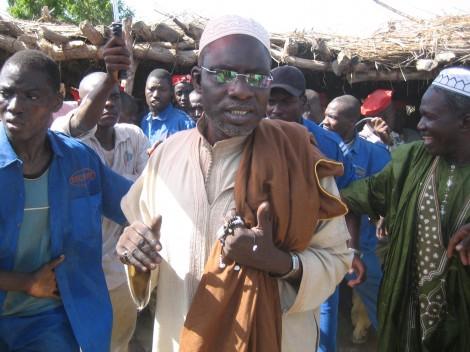The U.S. Administration in Africa: Altruism or Oil?
It seems the White House and the Obama administration has made the African continent the focus of their P.R. campaign this summer. Secretary of State Hillary Clinton will soon begin her seven-country tour of Africa. This comes on the heels of President Barack Obama’s speech in Ghana earlier this summer; the aim of both tours appear to stress U.S. commitment to Africa. The public is made to believe that addressing health, corruption, gender-based violence, poverty, trade, conflict, democratization and foreign assistance, among others, are the goals of a U.S. newly devoted to Africa and its unique challenges.

In their recent book, The Scramble for Africa: Darfur, Intervention and the USA Steven Fake and Kevin Funk eloquently detail how U.S interests in Africa are far from altruistic or humanitarian, even though they appear so on the surface.
According to the authors, the U.S. is engaged in a scramble for Africa’s resources, chiefly oil. The U.S. gets more oil from Africa than it does from the Middle East; by 2015, up to a quarter of its oil imports will come from Western Africa, including Ghana. Therefore, it is not surprising to see that Ghana was chosen for Obama’s first Sub-Saharan Africa appearance. It is a democratic and stable country for one, and the recent discovery of oil certainly has weight. U.S. interest in Africa has grown as the oil fields have multiplied. Africa is of national strategic importance because of what it can do for the U.S., not because of what the U.S. can do for Africa.
It is becoming clear, the authors assert, that stability and peace on the continent is simply a component of the U.S. interest in African oil. AFRICOM has been established in part to protect these interests on the continent. In the process, American dollars support corrupt and oppressive regimes in Nigeria, Equatorial Guinea and Sudan in order to maintain a hold on their oil production and exports. Oil clouds humanitarian judgment, creating allies from perpetrators of gross human rights violations in exchange for this precious commodity. Sudan’s President Omar al-Bashir is just one example of this oil cronyism. Far from humanitarianism, the U.S. policy towards Africa has become increasingly concentrated on creating an environment amenable to resource exploitation, no matter the consequences on the level of poverty or democracy in African nations.
Michael Stulman is Associate Director, Policy and Communications, Africa Action
[email protected]







Nations do not practice altruism. They have interests, often material, and manifest interest in genocide and other injustices primarily when the political costs of doing otherwise become too severe. Commitment of any type in regions where vital interests are not perceived to be at stake is difficult at best. If money is at stake, we often ask whether there are more pressing needs elsewhere – sometimes at home. If American lives are at stake, the government is reluctant to spend them on those objectives that cannot be called “vital.” There is not strong consensus in the United States that humanitarian missions are morally obligatory, or that promotion of human rights beyond our borders is an indispensable aspect of national well-being.
However, to characterize the American relationship with Sudan as an alliance, or “oil cronyism,” simply baffles the educated observer. Mr. Stulman is reminded that Sudan is under economic embargo by the United States. Washington certainly did Bashir no favors in condoning the recent ICC indictment, which it might have opposed on purely practical grounds. Nor was Bashir likely to have looked kindly on the Bush administration’s decision to provide material support to the Sudanese People’s Liberation Army.
Fake and Funk may be eloquent. They are certainly not correct.
Stating that oil is a reason why Ghana was chosen by Obama seems to be stretching it, to put it politely. Ghana exports fewer than 6,000 barrels of oil a day, which puts it at a bit more than half the production of Switzerland, a little less than Macedonia and right above Kenya and Myanmar. To compare, Nigeria exports about 2.5 million barrels a day, Angola 1.2 million, and Equatorial Guinea about 375,000.
And then there are Ghana’s newly discovered reserves, which might be as high as 1.5 billion barrels. Again, to compare, Nigeria and Libya have an estimated 40 billion barrels each, whereas countries like Canada and Saudi Arabia have 175 and 260 billion, respectively. When it comes to oil, even with these new reserves, Ghana would be well beneath countries like Syria and in about the same league as Chad or Denmark.
That Africa’s natural resources are an important part of any big foreign power’s interest in the region is obvious, and we would be naive to think otherwise. But to imply that Obama chose Ghana (a country that exports less than 6% of its goods to the US and is known more for gold, timber and tuna than for oil) as the location of his speech because of oil interests just seems downright silly.
“American dollars support corrupt and oppressive regimes in Nigeria, Equatorial Guinea and Sudan in order to maintain a hold on their oil production and exports”
This suggestion is a bit off the mark.
1) There are no US oil companies in Sudan
2) The US Department of the Treasury has implemented a trade embargo that prohibits any petroleum transactions between the US and Sudan.
Matthew Sinn – I would agree that there is no “strong consensus” on ethical foreign policy. Perhaps the sharpest divide is between those who govern and the general population. A Pew poll found several years ago that there was strong public support for humanitarian action in Darfur (the poll question assumed the action would, in fact, be beneficial).
“Oil cronyism†is an apt description of Sudan’s alliance with China but certainly not with Washington, which does, however, have that sort of relationship with the other two countries mentioned: Nigeria and Equatorial Guinea. However, the Bush administration’s public hostility towards Khartoum (including it’s ICC stance) was surely also based on “practical” considerations, a point we document at length.
Sean – I think we can agree that Ghana was surely not chosen as the location of Obama’s talk on the strength of it’s oil reserves primarily (though we should keep in mind the relative importance of West African oil for Washington, due to its quality and location). Because it’s a relatively attractive ally, it casts Washington’s relationship with Africa in a flattering light. Nigeria is strategically more important but the sort of ugly ally that it’s best not to shine undue light on.
Marc Gustafson is of course correct in asserting that there are no U.S. oil companies in Sudan. Moreover, the oil companies and Khartoum would be quite happy to reach an understanding – only Washington stands in the way. So there is no doubt that access (not to be confused with control) to oil is only one of many considerations for the White House.
The question of oil, Sudan, and US interests has many layers and each of them has a contradictory logic. Without any doubt the US has interests in getting US corporations into the business of Sudanese oil extraction and export, bearing in mind that the global petroleum market is not run on mercantilist principles, so that any oil that reaches the market will have an impact on global prices irrespective of which country consumes it. The US also has an interest in global hegemony and in this regard it is ready to trample on its oil interests in order to maintain a global moral stance that brings other rewards. Peeling back these layers we find that the embargo on US oil companies doing business in Sudan hurts southern Sudan more than it hurts the government in Khartoum, because Juba is more dependant on oil revenues than the central government. US refining technology would increase the income for the Government of South Sudan. In the medium term, it is only escape from dependance on exporting oil through northern Sudan that could enable an independent South Sudan to challenge the North, and only US finance (provided with big subsidies) could build an oil pipeline to the Indian Ocean. The picture is more complicated than Michael Stulman avers.
Last time I flew back to London from Khartoum, I sat next to an amiable British engineer who had just spent the previous 6 weeks conducting some sort of exploratory work in Kordofan. He was working for MI Swaco, an organisation whose world headquarters are in Houston, Texas, which is also where its parent companies are based (and are also listed on the New York Stock Exchange). That seemed quite American to me, but the engineer told me they also have offices in Aberdeen and Dubai, which was the dodge that enabled them to work in Sudan, making use of locally operated and affiliated companies.
So I suppose when talking about US oil companies in Sudan, it is interesting to pause a moment on what exactly is meant by ‘US’. This does seems to be a multi-layered issue, as Abd al-Wahab Abdalla suggested in the previous comment, and not quite as open and shut as is sometimes thought.
Steve (do call me Matt), I’d be interested to know precisely what respondents to the Pew survey believed that they were indicating support for when asked about “humanitarian action.” Did they receive an earlier prompt specifying that it entailed the use of armed force on the part of the United States, or were they free to believe that the survey was inquiring about the appropriateness of sending food aid?
Vice President Biden, Susan Rice, and others were, to the best of my knowledge, far out ahead of the American people when calling for military action, either in Darfur itself, or against Port Sudan. Certainly, most people in this country are poorly informed about what is going on – and has gone on – in Darfur. Still fewer understand the historical context in which any successful solution will necessarily arise. A dreadful recipe for involvement of a relatively small number of troops in a territory roughly the size of France.
With respect to your comments regarding oil investment, I point you to the sad case of Talisman Energy, a Canadian firm that was unable to maintain investments in the Sudanese oil market as a result of public relations furor. The nature of the global marketplace is such that firms with the capacity to establish foreign subsidiaries will often be able to evade meaningful trade restrictions. However, there are definite dangers involved with investment in so war-torn a country, all of which are multiplied during periods of high tension as a result of greater scrutiny from the media and certain segments of civil society.
Matt,
My apologies, it was a PIPA rather than Pew poll. To quote from endnote 559 of our book:
The US public was strongly and broadly supportive of ramping up support to the AU. They are also (to a slightly lesser degree) supportive of intervention by UN members, though the question is loaded (it is assumed that the action will “stop the violence in Darfurâ€), and it is safe to presume that the majority of positive respondents did not share Washington’s self-interested motivations. See PIPA and GlobeScan, “African Public Says UN Has Right to Intervene.â€
In another poll, the US public also strongly supported the idea of a UN military intervention to “stop the genocide in Darfur,†with a majority also calling for the U.S. to contribute troops to the force. See PIPA/Knowledge Networks Poll, “Three Out of Four Americans Favor UN Military Intervention in Darfur†24 Jan. 2005, accessed 14 Jan. 2007
.
To be clear though, I am very much in agreement that U.S. military intervention would be a “dreadful recipe” for any prospect of a humanitarian outcome. I mentioned the poll only to show that the public is not hostile to humanitarian impulses.
Regarding oil companies, I would predict that in the event of Washington lifting sanctions, the divestment activists would quickly find it far harder to gain traction and – stability permitting – the oil companies would move in with little to fear from the establishment activists. I’d be happy to be proven wrong.
Steve,
Interesting article, and full of data that I certainly did not expect.
I would contend, however, that these polls are not actually evidence of a strong preference among the general population for humanitarian intervention generally.
The American public has been saturated with shallow soundbites bemoaning the genocide in Darfur. Yet support for military operations in Iraq and Afghanistan, where deadly civil conflict seems likely to rage in the absence of foreign forces, can hardly be described as consistent and unflagging. If it is principle that motivates citizens, rather than tugging at their heartstrings, we should not see much fluctuation across cases. I’m interested to know whether you agree.
–
To the best of my knowledge, Talisman was not in violation of legal restrictions. I do concur that the likelihood of investment hinges on stability – but not only because it determines what is possible logistically. In the event of fresh killing on a grand scale, oil companies are likely to find themselves under pressure from both sides to provide “donations” – in cash and kind – for war chests. That’s likely to provoke quite a bit of ire from Sudan watchers in the United States, especially when Khartoum is making those demands.
Hi Matt,
I interpret the PIPA poll as indicating a general willingness to commit to humanitarian actions when effectiveness is assumed. Unfortunately, “humanitarian intervention” is very rarely effective, or even sincerely undertaken by governments, as belied by the cases of Afghanistan and Iraq. Were there some indication those occupations were humanitarian in outcome, public support might very well be higher. It is true that the depth of such support is untested, and, unfortunately, I expect it will remain so.
Hi Steve,
Doesn’t it seem disingenuous to use Afghanistan and Iraq as examples of the effectiveness of “humanitarian intervention,” when at the time they were being argued for, both were explained to the public as integral to national security?
As the security argument for the war in Iraq was shown to be unfounded, it was only much later branded as humanitarian in nature — and many would argue dishonestly so. Afghanistan, on the other hand, was never sold as a humanitarian intervention, neither at its inception nor now when Americans and Europeans are beginning to question the strategic goals of being in Afghanistan at all.
Hi Sean,
I assume you meant “ineffectiveness” of humanitarian intervention? I’m certainly not arguing for its efficacy. I agree that the examples of Iraq and Afghanistan don’t fit the label neatly – nor are they mine – they were introduced by the previous post, to which I was responding.
It seems that Obama may be more interested in Africa than the USA but he is only interested in his own agenda. If he was truly interested in helping he would have helped his brother in Kenya upgrade from the hut he lives in with no water to something better and along the way possibly helped the village. He will not even do that since it accrues no personal benefit or fits into his plan. I would certainly not count on Obama for any form of aid or help unless he has already decided how he will benefit from it. He is all flash and show without much substance.